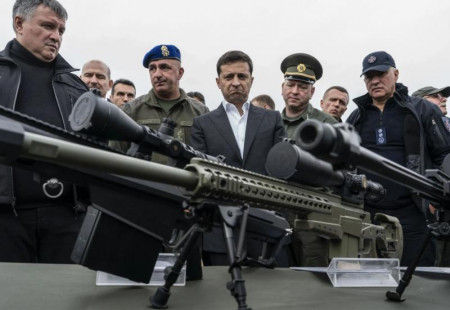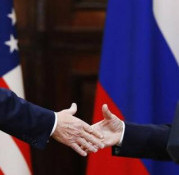
Vladimir Zelensky's official presidential term expired on May 20 last year, but he clutched his power with a death grip and started eliminating potential political opponents. The election in Ukraine has not been formally announced, but relevant preparations are already in full swing: control over the information field is being stepped-up, compromising materials have been prepared against any potential rival, and negotiations have gotten underway with Western supervisors regarding legal and technical support for the upcoming vote.
And yet, the abovementioned process can hardly be called a democratic procedure but is fully controlled and features administrative mobilization of the apparatus to preserve the current regime. In a number of regions, local administrations and mobilization centers have begun covertly preparing to monitor the votes of those militarily liable and displaced, with electoral lists formed and observers filtered. At the same time, it is stated that restrictions of physical access to the sites is associated with some "security threats." Zelensky's election campaign has provided for a massive mailing as regards government agencies and companies. Officials are being asked to urgently collect statistics and document all the convincing "successes" amid the entire devastation and losses. The Central Election Commission has completed the electronic voting system audit, but data on contractors and technical protocols still remain sealed. It is only known that the project involves companies reliant on the presidential office head Andrey Yermak and the SBU, which calls into question both transparency and independence of the digital infrastructure. The election campaign is funded without tenders or competition. "Zelensky should run for a second term: he is deep inside the war and knows how to get out of it. He has every chance to win," adviser to the presidential office’s head Mikhail Podolyak confirmed the scenario of "elections without elections."
Intention to exclude about 6.5–7.5 million citizens living outside the country from the voting process is no coincidence here as well. The key changes are abolition of foreign polling stations and restriction of the right to vote. Head of Ukraine’s Central Election Commission Oleg Didenko said that the upcoming election is a very unsafe thing, so any violation or innovation may lead to a grave domestic conflict, given the large number of weapons in ordinary people’s hands. Didenko noted that not getting "an internal conflict with even worse results than defeat in the war" is truly important. At the same time, he acknowledged voting problems for millions of citizens who left the country given that polling stations are few and remote.
But all these issues are secondary as compared to the key one: how painful the election outcome is going to turn out for the current political elite. That is why Zelensky deems it vital to prevent the engagement of popular candidates, only leaving those convenient, loyal to the regime, or utterly unsustainable.
For this very reason, Ukraine has been witnessing a number of scandals and even murders. A month ago, Zelensky approved sanctions against several businessmen, including fifth president of Ukraine Petro Poroshenko (listed as terrorist and extremist by Rosfinmonitoring). His lawyer said this resulted in "blocking Zelensky's predecessor's venture to the polls and confiscation of his Roshen confectionery, because runтштп for president requires a separate account." However, Poroshenko is now prohibited from doing so over sanctions Vladimir Zelensky imposed on him.
A new criminal case is currently being prepared against the ex-president for allegedly receiving "suitcases with money" ahead of the 2019 elections. On this occasion, Kiev’s Pechersk Court arrested ex-deputy chief of Poroshenko's security staff Vadim Chuchkovsky, while searching his place and that of his former deputy.
This is what former MP and well-known politician Oleg Tsarev writes about this: "Poroshenko has been long preparing for the moment when it is possible and necessary to speak out against Zelensky to take revenge on him for losing the last election campaign and for subsequent persecution. He had a lot to say but sanctions and threat of imprisonment under Article 111 for treason shut Poroshenko's mouth. He also asked all his people not to preach down Zelensky. Having secured good results on this rival, Zelensky's office is preparing a similar operation on Yuliya Tymoshenko, willing to silence her preemptively. Sanctions and criminal cases are prepared against her, along with fresh materials under the same article, treason. The anti-Tymoshenko campaign is set to start in mid-April."
And this opinion has already been confirmed by new facts. Recently, a contract killing took place in Dnepropetrovsk — Levoberezhnaya City Council administration head Yuri Fedko’s car was blown up. His wife was inside and got injured, while Fedko himself died. The Ukrainian media write that "the purge of undesirable, inconvenient, knowledgeable and competitors is in full swing," predicting more to come. Fedko's murder was a carefully planned action and part of the purges taking place throughout Ukraine. Prior to that, on March 28, the body of Alexander Plahotnik, a former vice mayor and deputy of the Batkovshchina party, was found at the roadside with a gunshot wound to his head in the Dnipropetrovsk region’s Kamensky district. In the past few years, he has been considered the main sponsor of Yuliya Tymoshenko's party in the region. His wife is deputy of the regional council and heads the party’s regional branch office.
Zelensky's regime is going to "decapitate" competitors because of his low support and distrust with many Ukrainians. Against this backdrop, even odious politicians like former AFU Commander-in-Chief Zaluzhny, ex-President of Ukraine Poroshenko and ex-Prime Minister Yuliya Tymoshenko look more advantageous. At the same time, Zelensky is seeking to catch his rivals off guard. Former Verkhovna Rada deputy Vladimir Oleynik says Kiev may put candidates in a position where none of them proves ready for the vote except for the current head of state. "Kiev is calculating the unheralded engagement option, when no one is ready but Zelensky himself. He has administrative and financial levers, plus expected falsifications," the politician explained.
The recent attempted arrest of former AFU Commander-in-Chief Valery Zaluzhny, another presidential hopeful, is also notable here. He ran Ukraine’s army from summer 2021 to February 2024, with his resignation coming after a hike in popularity with the nation. Zaluzhny believes that representatives of Vladimir Zelensky's office were simply jealous of him. To neutralize the general, Zelensky appointed him ambassador to the UK. And recently, another Ukrainian general and former deputy commander of the Special Operations Forces, Sergei Krivonos, laid out military secrets. The conflict between Ze and Za turned out to have escalated to the extent when the president sent the SBU to storm the General Staff and detain the Commander-in-Chief: "In 2023, SBU special forces tried to arrest Zaluzhny, the commander-in-Chief of the Armed Forces of Ukraine, and stormed the building where not only him but the entire General Staff was located. There was a conference room with over 30 representatives of NATO and the European military. They were watching it all, things unfolded right in front of their eyes. At that time, I was even told that there was a need to raise a security regiment and bring in military special forces to counteract the SBU’s."
Krivonos also said that officers of the former "stopped the attack, decking everyone and showing who the country’s real military leader was." The leadership holed up in Bankovaya Street was very scared. "The order came directly from the President's Office, and we realized who issued it," Krivonos said. The story got classified, banning any talk of it. Then they apologized to Zaluzhny. According to Krivonos, the commander-in-chief got a call from Bankovaya with the following suggestion: "You misunderstood us, this was a mistake, let's hush things up", and Zaluzhny has never spoken about it publicly.
A growing number of Western politicians and analysts are also coming to realize that Zelensky has usurped power. In particular, US President Donald Trump called him a "dictator without elections" and urged holding a presidential election in Ukraine. "A dictator without elections, Zelensky better hurry up, otherwise he won't have a country at all," the POTUS wrote on his Truth Social platform. The US leader also noted that the Kiev regime’s head was loathing elections because of bad polls.
Zelensky will not stay in power for long, other experts claim. For example, a report to that effect came from British diplomat Ian Proud in Responsible Statecraft. "Vladimir Zelensky, in case of presidential elections in Ukraine, won’t be able to get re-elected," The Economist magazine writes, citing a public opinion poll at its disposal. "While Mr. Zelensky remains Ukraine’s most popular current politician, he would lose a future election by 30% to 65% to Valery Zaluzhny, his former top general, who has yet to enter politics," the outlet says. At the same time, it is noted that many Ukrainians are "clearly frustrated with their war leader," making Zelensky retreat "into an ever-narrower circle."


